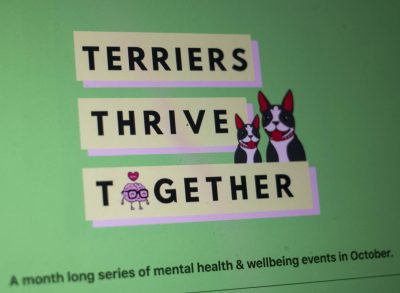Isolation, fear and loneliness — from remote classes through the pandemic to a post-vaccination return to in-person schedules — mental health struggles have been difficult for many students.

To help students struggling with mental health, the Terriers Thrive Together project is hosting events to promote on-campus resources throughout October. The fair addressed many intersections of mental health, including for students of color, individuals with disabilities and sexual assault survivors.
The project was virtual last year, and coming out of the pandemic, the organizers prioritized getting support and resources to students in both in-person and online events. The events this year range from support groups, writing workshops, community conversations to social outings, and involve events both open to the general BU community and specialized to specific marginalized groups.
Savannah Majarwitz, a senior in the College of Arts and Sciences and co-chair of the Student Government Mental Health Committee, said the project is a collaboration between different groups on campus such as the Student Government Mental Health Committee, Center for Psychiatric Rehabilitation, Behavioral Medicine, Wellness and Prevention and Wellbeing Project.
“It’s really just to open up a broader awareness about mental health, and then also see where the gaps are,” Majarwitz said. “We want to hear feedback from students, we want to know how we can improve … we want to know how we can communicate that directly to administrators, and how they can expand resources.”
Terriers Thrive Together held a Mental Health Fair at Marsh Chapel Plaza on Oct. 13, showcasing a range of booths and information from Behavioral Medicine, student organizations such as Campus Survivors and, perhaps the crowd’s favorite, a mental health support dog.
Melissa Paz, assistant director of Mental Health Promotion with Student Health Services, said the goal of the fair was to show students what mental health resources are available on campus.
“The visibility of mental health as an important issue really is becoming more and more visible,” Paz said.“Students are becoming aware of the issues and aware of the importance of destigmatization, and events like this one [help] to do that.”
Paz said students struggling with their mental health should know they can reach out to many services on campus for help.
“Tapping into your emotions and acknowledging whatever it is that you’re feeling, regardless of how you would label it, is so important, and to know that [you’re] not alone,” Paz said. “If [students] don’t know where to look, just asking someone and starting somewhere is often just a very good first step.”
Brooke Angell, a senior in CAS and president of Active Minds, said the BU club focuses on destigmatizing mental health issues.
“You’re always going to have people who are dealing with depression, anxiety, stuff like that,” Angell said, “[and] with the stress of the pandemic and coming back to school while the pandemic is still going on, that’s very stressful.”
The fair also showcased several booths from outside organizations based in the greater Boston area, including DeeDee’s Cry, an organization dedicated to suicide prevention for communities of color and advocating for the importance of mental health education and resources.
Toy Burton, founder and executive director of DeeDee’s Cry, said the pandemic has had a significant impact on mental health issues for communities of color, including “disparities when it comes to just health care period.”
“The biggest part is about having these conversations, and having people share their stories to break down the stigma that surrounds mental health and communities of color,” Burton said.
Christopher Robinson, coordinator of outreach and training at BU’s Disability and Access Services, represented the department with a booth at the fair.
“Mental health is broad, ambiguous. It is a gauntlet that we have to migrate through,” Robinson said. “Disability Access Services approaches mitigating the stress of mental health [for individuals with disabilities].”
Majarwitz said she has “mixed thoughts” on the University’s support for mental health services, but said BU Student Activities Office funding the fair is an appreciated and good step.
“I think that says that they’re willing to support events on mental health,” she said. “I would really like that effort and passion to also be translated into supporting more services for students.”